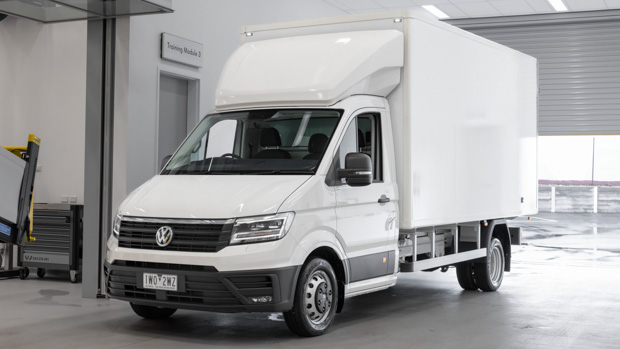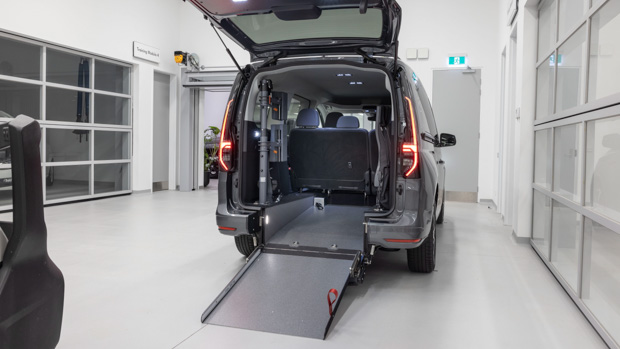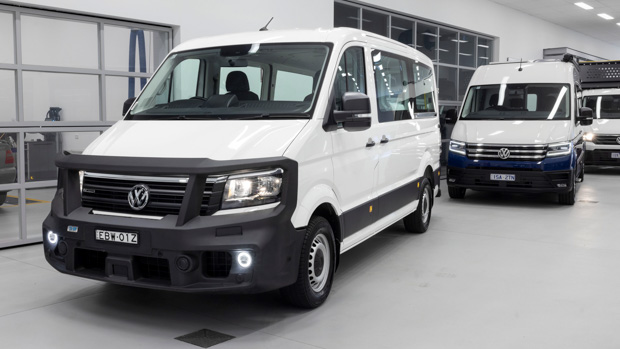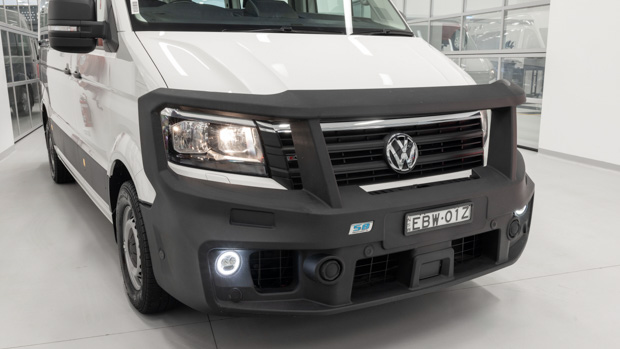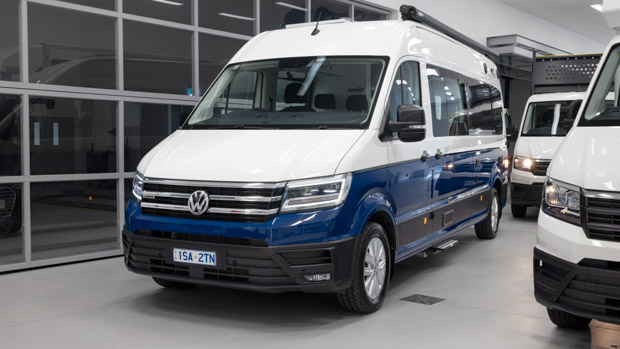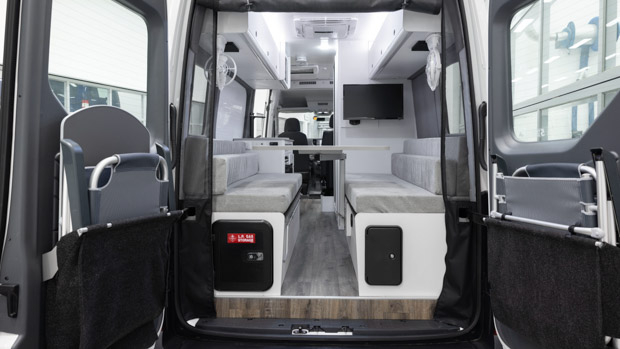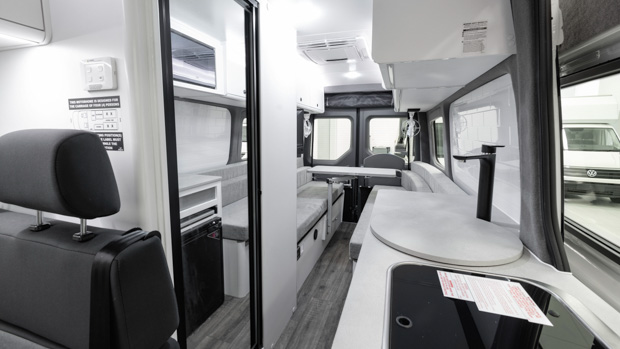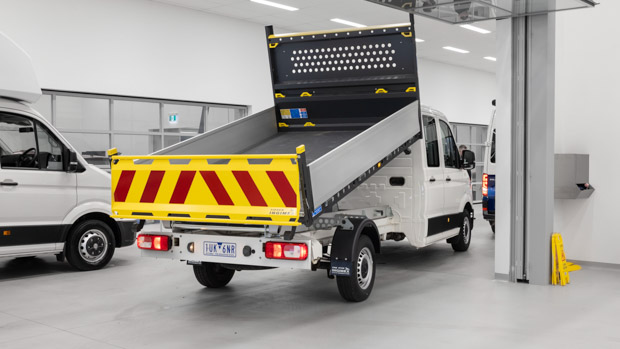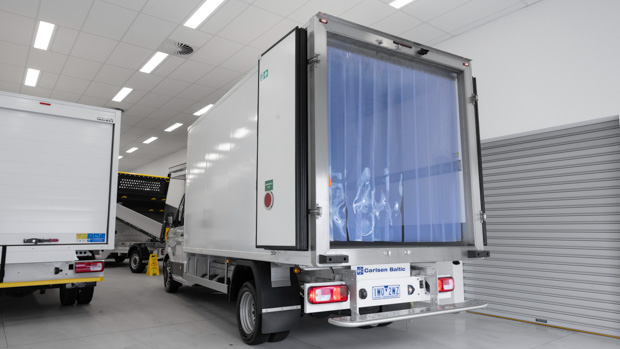-
Car Reviews
- Car News
-
Car Comparisons
Latest comparisons
- Chasing Deals
Volkswagen’s new turn-key “conversion” vehicles were shown off at the brand’s regional training centre in Melbourne
As a brand that’s no stranger to collaborations on special projects, it’s little surprise to see Volkswagen Australia extending its local offerings with a range of new “conversion” vehicles.
During a recent event at Volkswagen Australia’s new regional training centre in Melbourne, six vehicles were on display, all variants on the standard range, and catering to different niches in the market.
Ryan Davies, the Volkswagen Commercial Vehicles director said that the division “is committed to selecting the best blend of overseas and Australia suppliers to create unique solutions in the market.”
Six vehicles were displayed during the presentation, ranging from a wheelchair-accessible Caddy small van, to the larger Crafter with a tipping tray, and everything in between.
While some were already approved for Australian sale, such as the Crafter emergency vehicle and the aptly-named Kampervan, others were up for evaluation for the local market.
“From ambulance fleets to wheelchair access vehicles, from refrigerated transport to tough tipper bodies, the Caddy and Crafter in particular provide the perfect basis to provide versatile and integrated solutions – factory backed with warranty, turn-key solutions that are ready to go,” Davies added.
First up was a Caddy Maxi with a rear cut-out for wheelchair access. Unlike a number of Volkswagen Australia conversion providers, this one is carried out by a firm in Germany by the name of AMF Bruns GmbH & Co.
Based on the Caddy Maxi, which is usually sold as a seven-seater in Australia, a portion of the rear of the vehicle is cut out to create space for the ramp assembly.
Despite the fact that this Caddy has a large portion cut out of the rear, Volkswagen stated that safety is still a priority, and it has been torsion tested as well as crash tested with forces up to 20g.
Currently, the wheelchair accessible Caddy Maxi is still being homologated for the Australia market, but Volkswagen plans to have it on sale in the second half of 2023.
Pricing is still yet to be confirmed, but it will be in the region of $25,000 over a standard Caddy Maxi. Considering the starting price of Caddy Life Maxi at $52,640, this will put in around $77,000 before on-road costs.
Next up was the Smartbar which had been fitted to Vokswagen’s Crafter 35 Medium Wheelbase.
According to Volkswagen Australia, this conversion came to be following a direct request from local emergency services for use in first response fleets.
Supplied by ARB, this Smartbar was designed and manufactured in Australia, and is made entirely of polyetheleyne in order to keep weight to a minimum.
In the event of an accident, the Smartbar will flex and absorb force upon impact, before being able to pop back out to its original shape.
As well as meeting all safety requirements, the Smartbar works with the Crafter’s complex radar and sensor system up front, meaning that all active safety systems remain in working order.
The Smartbar for the Crafter 35 is available now, priced from $3658 on top of the vehicle cost.
Following in the Australian-built theme, the Crafter Kampervan is another home-grown collaboration, converted at Jayco’s facility in Dandenong South.
Though Volkswagen already offers a factory-converted Crafter campervan in the form of the Grand California in international markets, Australian Design Rules mean that this isn’t able to be sold here.
Measuring at 6.8-metres long, and two metres wide, the Crafter Kampervan is an impressive unit, and one designed to feel like a home away from home.
Under the bonnet sits a 2.0-litre turbo diesel engine that makes 130kW and 410Nm of torque, which is set to all four wheels (as standard) via an eight-speed automatic transmission.
As a fully-fledged campervan, it’s able to seat up to four occupants on the road, and can sleep up to three comfortably, with the fourth person presumably in a tent outside.
It also gets the full range of amenities including a kitchen with a gas stove, microwave, fridge and microwave. There’s a separate bathroom with a toilet and shower, as well as fresh and waste water tanks beneath the cabin.
The living facilities and entertainment features – such as a TV paired with an interior and exterior sound system – are supported by a 200W solar system and 120Ah lithium battery.
Those looking for a more intrepid experience can option the all-terrain package, which adds a 30mm body lift, all-terrain tyres, a rear locking differential, and underbody protection.
Volkswagen Australia confirmed that the first allocation of 69 units had already been exhausted, but are expecting to see another allocation land later next year.
In terms of pricing, the base Crafter Kampervan starts at $133,390 before on-road costs. Moving up to the Style will set buyers back $141,390 before on-road costs. The all-terrain package will be available as a $10,100 option on top of the Style when it goes on sale.
Volkswagen also used this event to show off three Crafter-based commercial vehicles, all converted to serve a specific hauling purpose.
The first two were converted by a company based in the United Kingdom, called INGIMEX.
Based on the Crafter Single Cab 50, the box body conversion is reasonably straightforward. It gets a payload of 1.75-tonnes, which is a class-leading figure for the sub 4.5-tonne truck segment.
The next INGIMEX conversion was a Crafter Dual Cab with a tipper body. Unlike the box body, this one is currently in the development phase, with Volkswagen Australia gauging local demand.
Finally, and arguably the most niche, we saw a Crafter 55 with a Eutectic Cold Goods Body, converted in Lithuania.
The body on display was a “-40 degrees Celsius Frozen Goods Truck”, which uses a system that doesn’t require engine power to stay cold. Instead, the system needs a six-hour “cool down” which is done at base via a three-pin plug. After this, it’s able to hold temperature for between nine and 13 hours.
Latest news
About Chasing cars
Chasing Cars reviews are 100% independent.
Because we are powered by Budget Direct Insurance, we don’t receive advertising or sales revenue from car manufacturers.
We’re truly independent – giving you Australia’s best car reviews.
